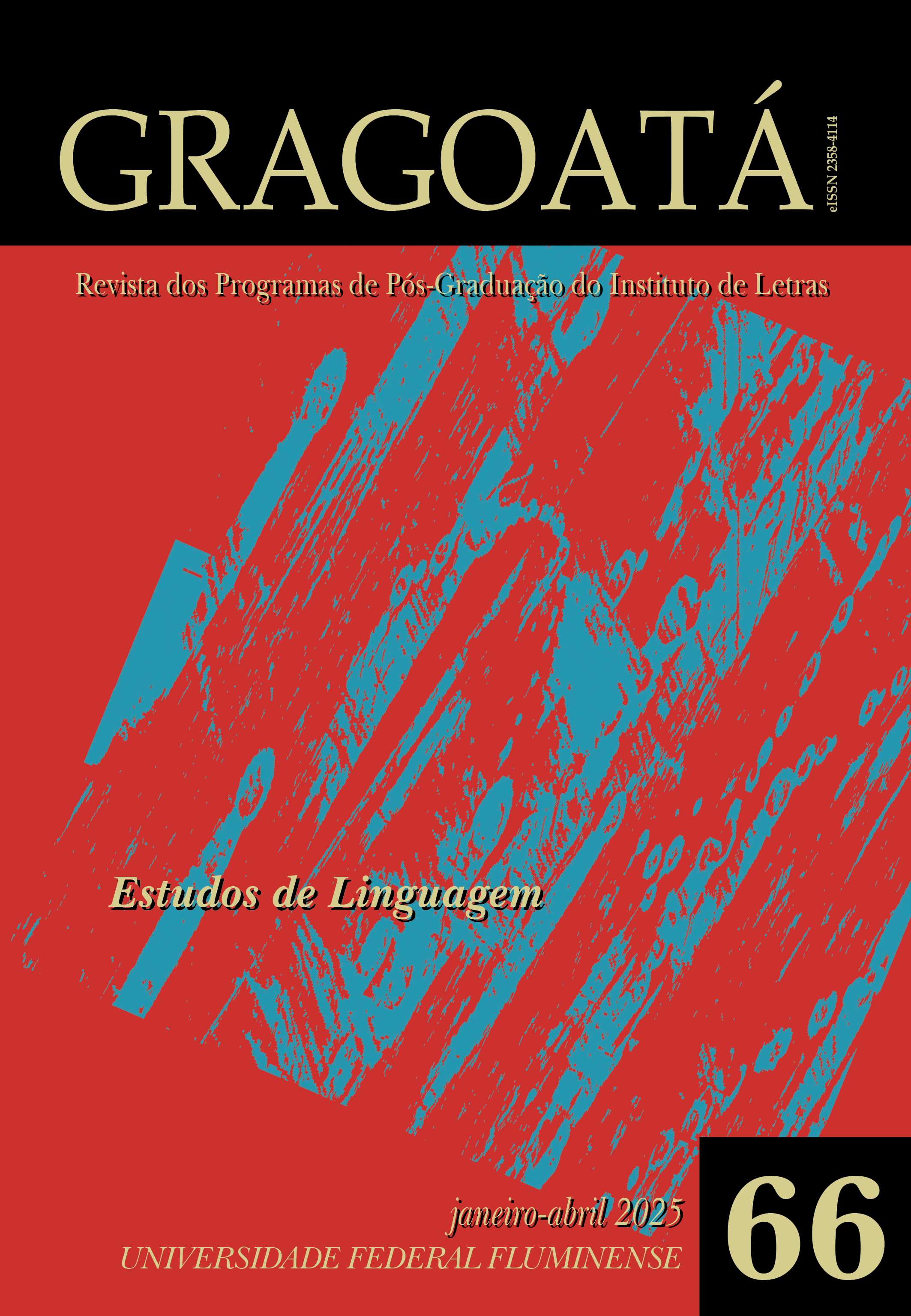Social Justice and Education for All: The Case of Multilingualism and Language Policies in Timor-Leste
DOI:
https://doi.org/10.22409/gragoata.v30i66.63902.ptKeywords:
Language Policy and Planning, Equality of Opportunity in Education, Timor-LesteAbstract
In this paper, we discuss theories of justice and equal access to education in a society (Apple; Buras, 2008; Bourdieu, 1999b; Bauman; May, 2010; Freire; Macedo, 2011; Giroux, 1986) and apply these theories to linguistic issues in the Timorese education system. Following independence and the drafting of the Constitution (2002), Tetum (the national and indigenous language) and Portuguese (the colonial and exogenous language) were formalized and regulated as instructional languages in all schools through the Education Law (2008). The adopted language policy has never been unanimous, and as a result, despite being a young state, Timor-Leste has undergone several changes in the linguistic planning of the Ministry of Education. The latest intervention and attempt to change is multilingual literacy, given that the territory comprises at least 16 distinct ethnolinguistic groups. We discuss here the sociological implications of this new proposal and evaluate, according to the theories discussed, whether multilingual literacy can indeed reduce inequality in access to school and academic knowledge and achieve greater empowerment of children and youth in rural and remote areas of the country. We conclude that the frequent changes over a short period of time have generated frustrations and mistrust among teachers, students, parents, and education managers regarding the competence of the Ministry of Education. Thus, we infer that these frequent changes have been more detrimental to the education system than the adoption of an exogenous language as the language of instruction, as commonly believed.
Downloads
References
APPLE, Michael W. & BURAS, Kristen L. Currículo, Poder e Lutas Educacionais: com a palavra, os subalternos. São Paulo: Editora Artmed, 2008.
ARAÚJO, Valente de. Um estudo sobre o rito de tradição oral ai-hulun e as suas actuais práticas religiosas e mágicas no suco de Mauchiga. 2016. Dissertação (Mestrado em Ensino do Português como Língua Segunda e Estrangeira) – Faculdade Ciências Sociais e Humanas, Universidade Nova de Lisboa, Lisboa, 2016.
BAUMAN, Zygmunt. Identidade. Rio de Janeiro: Jorge Zahar Ed, 2005.
BAUMAN, Zygmunt; MAY, Tim. Aprendendo a Pensar com a Sociologia. Rio de Janeiro: Jorge Zahar Ed, 2010.
BOURDIEU, Pierre. O Capital Social – notas provisórias. In: NOGUEIRA, Maria A.; CATANI, Afrânio (org.). Escritos de Educação. Petrópolis: Editora Vozes, 1999a. p. 65-70.
BOURDIEU, Pierre. Os Três Estados do Capital Cultural. In: NOGUEIRA, Maria A.; CATANI, Afrânio (org.). Escritos de Educação. Petrópolis: Editora Vozes, 1999b. p. 71-80.
CARNEIRO, Alan Silvio R. As Políticas Linguísticas e de Ensino de Línguas em Timor-Leste: desafios de um contexto multilíngue. 2010. Disponível em: http://www.revistas.usp.br/flp/article/viewFile/59854/62936. Acesso em: 1 jun. 2016.
CHEN, Jyh-Jia. Lutando por Reconhecimento: O Estado, os movimentos de oposição e as mudanças curriculares. In: APPLE, Michael W. & BURAS, Kristen L. (org.) Currículo, Poder e Lutas Educacionais: com a palavra, os subalternos. São Paulo: Editora Artmed, 2008. p. 201- 220.
DURAND, Frédéric. História de Timor-Leste: da pré-história à actualidade. Lisboa: LIDEL, 2009.
FREIRE, Paulo. A Importância do Ato de Ler. São Paulo: Cortez Editora, 2011.
FREIRE, Paulo; MACEDO, Donald. Alfabetização: Leitura do Mundo, Leitura da Palavra. Rio de Janeiro: Paz e Terra, 2011.
FOGAÇA, Helem Andressa. O Ecossistema Fundamental da Língua Mambae: aspectos endoecológicos e exoecológicos de uma língua austronésia de Timor-Leste. 2017. Tese (doutorado em Linguística, Português e Línguas Clássicas) – Programa de Pós-Graduação em Linguística, Universidade de Brasília, Brasília, 2017.
GIDDENS, Anthony. Sociologia. 9ª Edição, Lisboa: Fundação Calouste Gulbenkian, 2013.
GIROUX, Henry. Teoria Crítica e Resistência em Educação. Petrópolis: Editora Vozes, 1986.
INDART, Karin N. Rühle. Políticas da Educação, Políticas de Língua, Identidade Nacional e a Construção do Estado em Timor-Leste. 2017. Tese (Doutorado em Sociologia da Educação) – Instituto da Educação, Universidade do Minho, Braga, 2017.
MENEZES, Francisco Xavier de. Encontro de Culturas em Timor-Leste. Díli: Crocodilo Azul, 2006.
MINISTÉRIO DA EDUCAÇÃO DE TIMOR-LESTE. Ajudar as Crianças a Aprender: Uma Conferência Internacional sobre Educação Bilingue em Timor-Leste, vol. 2. Dili: ME, 2008.
NUNES, Marcelo Maria Pire. Análise aos Desafios da Implementação das Línguas Maternas no Ensino Básico. 2012. Monografia (Licenciatura em Língua Portuguesa) – Departamento de Língua Portuguesa, Universidade Nacional Timor Lorosa’e, Díli, 2012.
OLIVEIRA, Gilvan Müller de. Considerações Demográficas, Educacionais e Político-Linguísticas, 2009. IPOL. Disponível em: http://www.iplo.org.br/imprimir.php?cod=510. Acesso em: 30 de nov. 2016.
OPLOP (Observatório dos Países de Língua Oficial Portuguesa). Parlamento Atua em Defesa das Línguas Oficiais, 2011. Disponível em: http://www.oplop.uff.br/relatorio/anonimo/2773/relatorio-oplop-31-lingua-portuguesa-no-timor-leste-tensoes-na-almejada-superacao-do-hiato-entre-habitos-reais-normas-oficiais. Acesso em: 26 de maio 2016.
ROSÁRIO, Natércia Maia da Cruz. A Formação do Grupo Haktuir Ai-Knanoik em Timor-Leste: caminhos para a Educação Artística. 2022. Dissertação (Mestrado em Educação Artística) –Escola Superior da Educação, Instituto Politécnico de Viana do Castelo, Viana do Castelo, 2022.
TIMOR-LESTE. Constituição da República Democrática de Timor-Leste. Díli: Ministério da Justiça, 2002.
TIMOR-LESTE. Lei nº 14/2008. Lei de Bases da Educação. Jornal da República, Série I, nº 40, Díli, Timor-Leste, de 29 de Outubro de 2008.
Downloads
Published
How to Cite
Issue
Section
License
Copyright (c) 2025 Gragoatá

This work is licensed under a Creative Commons Attribution 4.0 International License.
Authors who publish in Gragoatá agree to the following terms:
The authors retain the rights and give the journal the right to the first publication, simultaneously subject to a Creative Commons license CC-BY-NC 4.0, which allows sharing by third parties with due mention to the author and the first publication by Gragoatá.
Authors may enter into additional and separate contractual arrangements for the non-exclusive distribution of the published version of the work (for example, posting it in an institutional repository or publishing it in a book), with recognition of its initial publication in Gragoatá.

Gragoatá is licensed under a Creative Commons - Attribution-NonCommercial 4.0 International.














